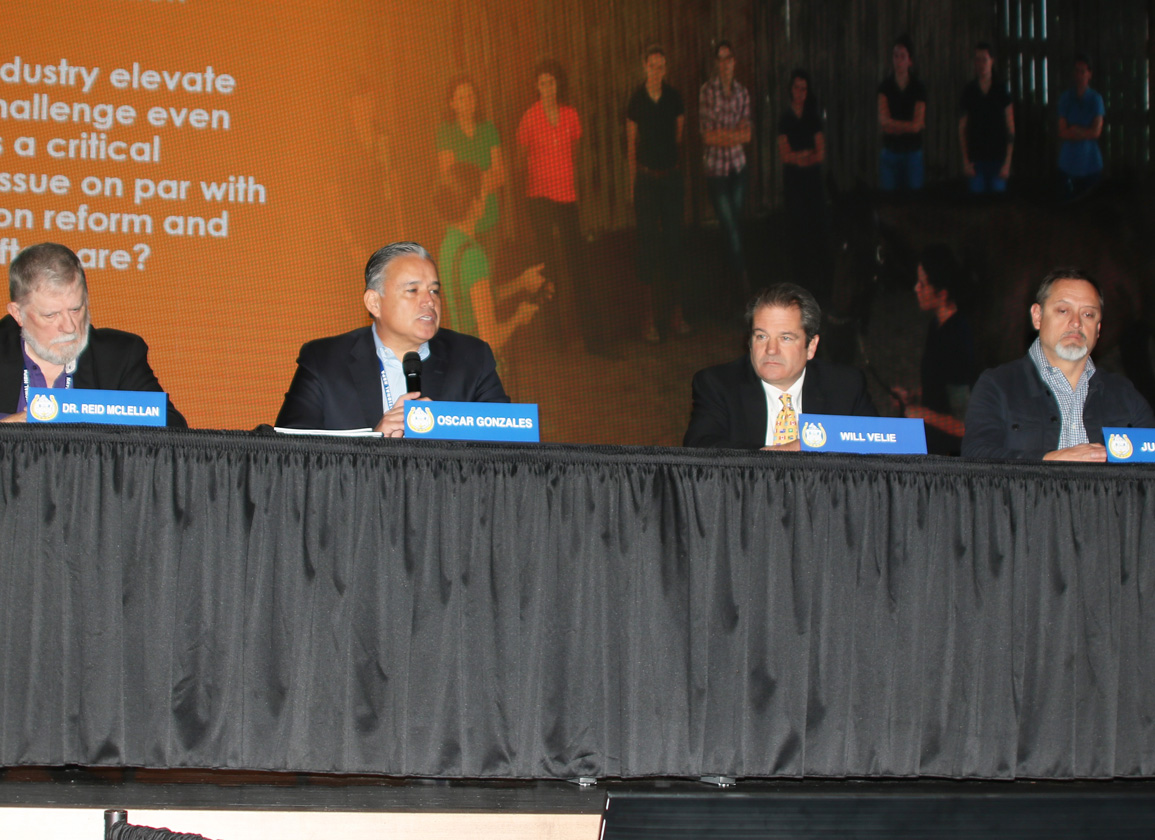By Jennie Rees
HOT SPRINGS, AR–The chronic shortage of backstretch workers is as critical as an issue facing horse racing as the need for medication reform and finding homes for retired racehorses.
That's the view of Remi Bellocq, the Bluegrass Community and Technical College's executive director for equine studies. Bellocq moderated a panel on employee development Friday morning for the National Horsemen's Benevolent & Protective Association Conference at Oaklawn Racing Casino Resort.
“What does it matter if you want to expand your operation with horses, build a new extension to our farm or barn if you don't have the workers to muck out the stalls, to care for the horses?” he said.
“In many cases, we have valued employees, but how do we keep them?” asked Bellocq, a former National HBPA executive director before going into academia. “How do we keep them from running down the street to go work at Amazon? Is it about pay? Is it about housing? Is it work-life balance or a combination? It's a lot easier to keep somebody than to train a new worker…. Is this an important enough issue for us to start the charge in our industry to elevate workforce to a national issue, just as we've done equine welfare and medication? I submit it is.”
Even before COVID hit the world, American horse trainers faced a chronic shortage of workers. Will Velie is one of horse racing's pre-eminent immigrant attorneys. However, he emphasized the necessity of the industry to build a pipeline nationally to find, train and retain American employees. He said it's vital to show the government the programs and efforts that horse racing makes to recruit domestic workers before requesting visas to provide a supplementary workforce.
Oscar Gonzales, a member of the California Horse Racing Board who also is assistant secretary for the U.S. Department of Agriculture, echoed that the industry can't bank on immigration reform coming to the rescue. But he offered a glimmer of hope through the Farm Workforce Modernization Act that has passed the U.S. House and is pending before the Senate. That bill would allow non-U.S. residents working in agriculture to receive Certified Agricultural Worker Status and put them on a path to being lawful, permanent residents.
“I try to remind people in the horse-racing industry there is tremendous upside to embracing our agricultural roots,” said Gonzales, who worked as a groom growing up and through college. “We've just got to figure out a way to get workers on racetracks … eligible for that.”
The panelists encouraged trainers to learn about and utilize existing resources that could make a difference for employees' quality of life. Those include access to education with programs such as Bellocq's, the Groom Elite courses offered at many tracks and English lessons.
Panelist Dr. Reid McLellan developed the Groom Elite program to improve the horsemanship skills of backstretch workers.
McLellan said that his team will take its training program to wherever there is a potential employment pool, such as correctional facilities. He said that also could include an area such as western Kentucky, where hundreds of chicken- and candle-factory workers are without jobs, homes or transportation in the wake of the devastating tornadoes in December.
Bellocq said having trained help is critical and that one issue facing racing is that horsemen don't know some of their employees' abilities.
“… A trainer hires a guy and he's on his phone trying to figure out how to put bandages on. Because the trainer didn't have any way of verifying 'what can this person actually do as far as his skill level?' That's one of the things we need to do.”
Gonzales noted there is a lot of grant money available if horsemen and their representatives develop partnerships with entities such as community colleges, chambers of commerce and health clinics.
“It is so incumbent upon us to tell our story, especially to policymakers,” he said. “Never let an opportunity go by to have your voice heard.”
Bellocq, who said the vast majority of his BCTC students are female, said it's a different world than when he came on the racetrack in 1975.
“You have to adapt; you can't make the workforce change for you,” he said. “If a young gal graduates from our program, she'll say, 'I don't want to work for Amazon. They're offering me more money, retirement, insurance. But I love horses. So meet me half way. Pay me enough so that's not a temptation for me to go work over there.'… The trainers, the owners, the farm managers who get that and understand that are the ones who are retaining their workers longer. The ones who refuse to change have a lot of turnover.
“… As business people, as horsemen, we're no different than the guy who has a landscaping or construction business down the road or Amazon. Either we compete and compete successfully for the workforce, or we don't. It's not a gray area.”
One thing facing today's horsemen is the extensive paperwork both employees and employers must fill out to be in compliance with labor regulations. McLellan spelled out best practices in managing a stable's workforce, recommending horsemen do a self-evaluation of their stable.
“The question to ask when you get done is: 'Would I work for me?'” he said. “… Make a labor plan. Let's sit down and look at a budget and see how can we afford to do the things we need to do to be competitive in the marketplace. Take advantage of what organizations like the HBPA offer. Because we do have access to bring in accountants, human resources people. We provide a lot of service. Because if you train your team, they will help you train your horses.”
Jennie Rees is a horse-racing communications specialist in the horse-racing industry, including working for the National and Kentucky HBPA.
Not a subscriber? Click here to sign up for the daily PDF or alerts.






